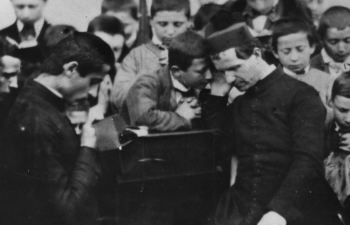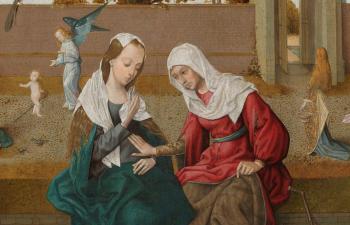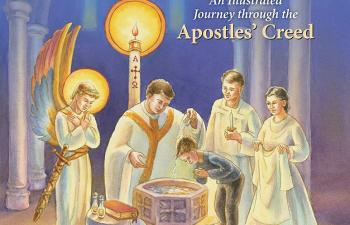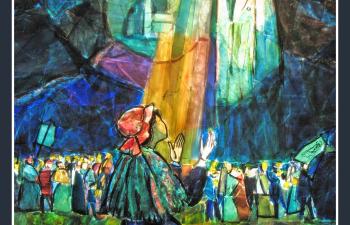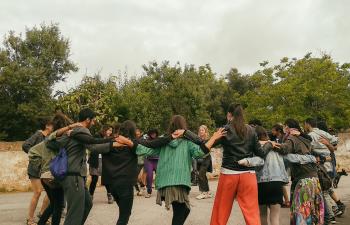Why marry in the Church? I ask this question because of a startling shift in our collective contemporary perspective. In the United States, Catholic marriage rates over the past four decades have precipitously plunged, with nearly sixty percent fewer weddings being celebrated in the Church in 2010 than in 1972.[i] Such a move away from sacramental marriage raises an important question for pastors, parents and catechists: why should couples today choose the Sacrament of Matrimony?
Of all the reasons, perhaps the most significant is this: sacramental marriage is distinctly supernatural. For all the magnificence, which is possible on the natural level in the love between a man and a woman, a sacramental marriage is qualitatively unique in its potential.
The fathers of Vatican II describe sacramental marriage in this way: “Authentic married love is caught up into divine love and is governed and enriched by Christ's redeeming power and the saving activity of the Church, so that this love may lead the spouses to God with powerful effect and may aid and strengthen them in the sublime office of being a father or a mother.”[ii] Rather than sentimentalizing marriage, this is, in fact, a richly precise statement. Human love is caught up, purified, transfigured through this sacrament because of the divinizing influence of the presence of Christ in the very midst of spousal love. Matrimonial grace makes marriage a great mystery. Husband and wife are not left merely to their own natural capacities. The very life of God enters into their way of seeing each other, of giving themselves to their children and encountering the world.
God’s gift of himself creates the possibility for genuinely Christ-like love and deep joy and is the most significant reason to be married in the Church. While God powerfully moves and works in any marriage when He is sincerely sought, the gift within sacramental marriage is staggering. The Catechism expresses it in this way: “Christ dwells with them, gives them the strength to take up their crosses and so follow him, to rise again after they have fallen, to forgive one another, to bear one another’s burdens, to ‘be subject to one another out of reverence for Christ’ (Eph 5:21; cf. Gal 6:2) and to love one another with supernatural, tender and fruitful love.”[iii] These are compelling words. It is because of the grace of this sacrament—freely cooperated with by a man and woman who actively seek out the presence of Christ in their marriage—that supernatural love becomes possible. The Catechism goes so far as to proclaim that “the sacrament of matrimony gives spouses the grace to love each other with the love with which Christ has loved his Church; the grace of the sacrament thus perfects the human love of the spouses, strengthens their indissolubility, and sanctifies them on the way to eternal life.”[iv]
But is this really true? What if these traces of the divine presence cannot be validated by a person’s own experience of sacramental marriage? There is today, of course, such brokenness and need when it comes to marriage. Moreover, many who receive this sacrament know nothing of the power of God, which exists—in potential—within their marriage. An important distinction must therefore be made. Matrimonial grace is objectively communicated and available in this sacrament—and yet utterly depends upon our desire and intelligent cooperation for its supernatural potential to be realized.
In his play The Jeweler’s Shop, the future John Paul II describes the need for spousal love to open itself to the mysterious working of the love of Christ. And, while human love longs for absolute beauty, it is through cooperation with matrimonial grace that such a yearning is fulfilled. He explains, “[the experience of natural] love carries people away like an absolute, although it lacks absolute dimensions. But acting under an illusion, they do not try to connect that love with the Love that has such a dimension. They do not even feel the need, blinded as they are not so much by the force of their emotion as by lack of humility. They lack humility toward what love must be in its true essence. The more aware they are of it, the smaller the danger. Otherwise the danger is great: love will not stand the pressure of reality.”[v]
And so, human love can open itself to being divinized through the dynamism of matrimonial grace. With a clear catechetical rooting of its meaning in such possibilities, we can help sacramental marriage recover its inherent appeal.
We hope you enjoy this issue of The Sower, focused as it is on the beauty of the Catholic vision for marriage and family life!
Notes
[i] Mark Gray, “Exclusive Analysis: National Catholic Marriage Rate Plummets,” Our Sunday Visitor, June 26, 2011.
[ii] Gaudium et Spes, par. 48.
[iii] CCC, par. 1642, emphasis mine.
[iv] Ibid., par. 1661.
[v] Karol Wojtyla, The Jeweler’s Shop (San Francisco: Ignatius Press, 1992), 88.
This article is originally found on page 4 of the printed edition.
This article is from The Sower and may be copied for catechetical purposes only. It may not be reprinted in another published work without the permission of Maryvale Institute. Contact [email protected]




